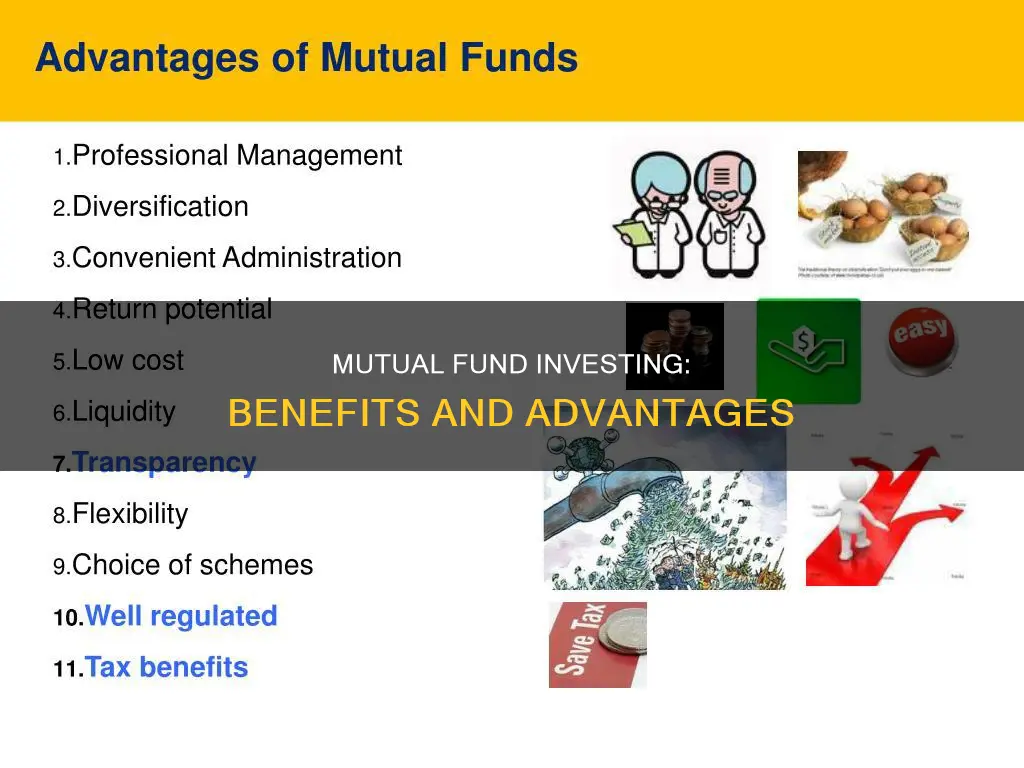
Mutual funds are a popular investment choice, offering a range of benefits to investors. One of the key advantages is diversification, allowing investors to spread their investments across a wide range of assets and sectors, reducing risk. Mutual funds also provide access to professional fund managers who actively buy, sell and monitor investments on behalf of investors. This advanced portfolio management is a convenient and affordable way to access investment expertise. Mutual funds are also associated with lower costs due to economies of scale, and investors can benefit from dollar-cost averaging and liquidity. While there are disadvantages to consider, such as fees and tax inefficiencies, mutual funds remain a popular and accessible investment vehicle.

Instant diversification
For example, an investor can choose to buy stocks from both the retail and industrial sectors. This reduces the impact of negative performance in one sector on the entire portfolio. Mutual funds allow investors to achieve this diversification with a smaller amount of money compared to buying individual stocks or bonds.
However, it is important to note that investing in a single mutual fund may not provide adequate diversification. Investors should be cautious of sector- or industry-specific funds, as their performance is tied to the fluctuations of that particular sector or industry. For instance, investing in an oil and energy mutual fund means that the performance of the fund is dependent on energy prices. If energy prices decline, the portfolio will likely suffer losses.
Therefore, it is recommended to spread assets among several leading industries to take advantage of gains in one sector while avoiding significant losses if another sector underperforms. This diversification across industries and asset classes is a key benefit of mutual funds, providing investors with instant access to a wide range of investments.
Everest Investment Funds: Is the Name Taken?
You may want to see also

Professional management
The benefits of professional management are twofold: not only do you gain access to the expertise of a dedicated investment professional, but you also save time and effort by not having to conduct the research and analysis yourself. This is especially advantageous for investors who may not have the time, knowledge, or resources to actively monitor and manage their investments.
The fund manager's role is to continuously monitor the market and adjust the portfolio to align with the fund's objectives. This active management approach ensures that your investments are being strategically optimised, aiming to maximise returns and minimise risks.
It is important to note that professional management does not guarantee market-beating returns, and past performance is not always indicative of future outcomes. The success of a mutual fund depends on various factors, including the specific holdings, the manager's skill, and overall market conditions.
Additionally, while professional management can provide valuable insights and strategic direction, it is ultimately your decision whether to entrust your investments to a fund manager or manage them independently.
Investment Funds vs Savings Accounts: Where Lies the Risk?
You may want to see also

Low fees
One of the key advantages of mutual funds is their low cost. Due to huge economies of scale, mutual fund schemes have a low expense ratio. The expense ratio represents the annual fund operating expenses of a scheme, expressed as a percentage of the fund's daily net assets. These expenses include administration, management, and advertising costs.
Mutual funds take advantage of their buying and selling volume to reduce transaction costs for investors. When you buy a mutual fund, you diversify without the numerous commission charges. Imagine having to buy each of the 10-20 stocks needed for diversification individually. The commission charges alone would use a good chunk of your investment. With mutual funds, you can make transactions on a much larger scale for less money.
Many mutual funds have low expense ratios of just 0.03 or 0.04% annually of your invested assets. That's only $3 or $4 for every $10,000 invested. These low-cost funds are usually passively managed index funds rather than actively managed funds. Some mutual funds even have no expense ratio. For example, Fidelity Investments introduced its line-up of no-fee funds in 2018, including the Fidelity ZERO Large Cap Index Fund (FNILX).
While mutual funds may be low cost, many of them do have high fees, so it's important to tread carefully. Be cautious of funds with expense ratios higher than 1.50% as they are considered to be on the higher-cost end. Also, watch out for back-end load fees, which are percentages deducted from your total when you sell the fund.
Equity and Debt Funds: Diversifying Your Investment Portfolio
You may want to see also

Liquidity
One of the key benefits of mutual funds is that they provide investors with access to their money when needed. Investors can redeem or sell their mutual fund units or shares at any time to meet their financial requirements. This feature is particularly valuable during financial emergencies or unexpected expenses. The redemption process typically involves contacting the fund company or broker and requesting the sale of the desired number of units or shares.
The redemption of mutual fund investments usually takes place on business days when the stock markets and banks are open. The funds from the redemption are generally credited to the investor's bank account within a few days, depending on the specific mutual fund scheme. For example, liquid funds and overnight funds may provide redemption proceeds on the next business day, while other types of funds may take longer.
It is important to note that different types of mutual funds may have specific redemption rules. For instance, units of closed-ended mutual funds can usually only be redeemed upon maturity, while certain types of funds, such as ELSS (Equity-Linked Savings Schemes) in India, have a lock-in period during which redemption is not allowed.
Mutual funds also offer the advantage of periodic investments through monthly purchase plans. This feature allows investors to invest smaller amounts regularly, rather than waiting for a large sum to accumulate. This flexibility in investment timing provides investors with liquidity and the ability to start investing with a smaller amount of money.
Additionally, mutual funds often provide the convenience of automatic dividend reinvestment. Dividends and capital gains distributions received from the fund can be automatically reinvested to purchase additional shares, helping investors' portfolios grow over time without requiring additional cash outlays.
In summary, mutual funds offer liquidity by providing investors with access to their money when needed, flexibility in investment timing, and the ability to redeem or sell their investments with relative ease. These features make mutual funds a convenient and accessible investment option for individuals seeking to balance their financial goals and liquidity needs.
Treynor's Management Rating: A Guide to Investment Fund Success
You may want to see also

Tax benefits
Mutual funds offer several tax benefits to investors. Firstly, investing in mutual funds can provide tax efficiency, especially when held for the long term. This means that investors can benefit from tax advantages by holding their investments for an extended period.
In certain jurisdictions, such as India, investments in specific types of mutual funds, like ELSS (Equity-Linked Savings Schemes), offer tax benefits under sections of the Income Tax Act. For example, in India, investments in ELSS of up to ₹1,50,000 qualify for tax benefits under Section 80C of the Income Tax Act, 1961.
Additionally, mutual funds can provide tax advantages through dividend reinvestment. Dividends and interest income earned by the fund can be automatically reinvested to purchase additional shares, helping your investment grow tax-efficiently. This strategy allows investors to compound their returns without incurring immediate tax liabilities on dividend income.
However, it is important to note that mutual funds can also trigger uncontrollable tax events. When a mutual fund sells securities that have generated capital gains, it often results in year-end distributions to investors, which are taxable. These distributions are typically taxed at either ordinary income rates or capital gains rates, depending on the holding period of the investments. Therefore, investors, especially those in high-tax jurisdictions, should carefully consider the potential tax implications of mutual fund distributions.
S&P 500 Index Fund: A Guide for Indian Investors
You may want to see also
Frequently asked questions
Mutual funds are an easy and accessible way to invest in stocks and bonds. They are simple to understand and can be bought from brokerage firms, online brokers, mutual fund companies, banks, and insurance firms.
All investments carry some risk, but mutual funds are typically considered a safer investment than purchasing individual stocks. Mutual funds hold many company stocks within one investment, so they offer more diversification than owning one or two individual stocks.
Mutual funds can be actively or passively managed. Actively managed funds aim to beat the market and are more expensive, while passively managed funds aim to replicate the market and have lower fees. There are also target-date funds, which adjust their allocation to be more conservative as a target date approaches.
You should decide on your budget and your goals, and then research different funds to find the best fit. You can buy directly from fund companies like Vanguard or BlackRock, but this limits your choice of funds. You can also work with a financial advisor, or buy through an online brokerage, which will offer a broad selection.
Mutual funds have expense ratios, which are annual fees charged by the fund company to cover the cost of running the fund. These are typically quoted as a percentage and are taken into account when calculating the fund's share price.







